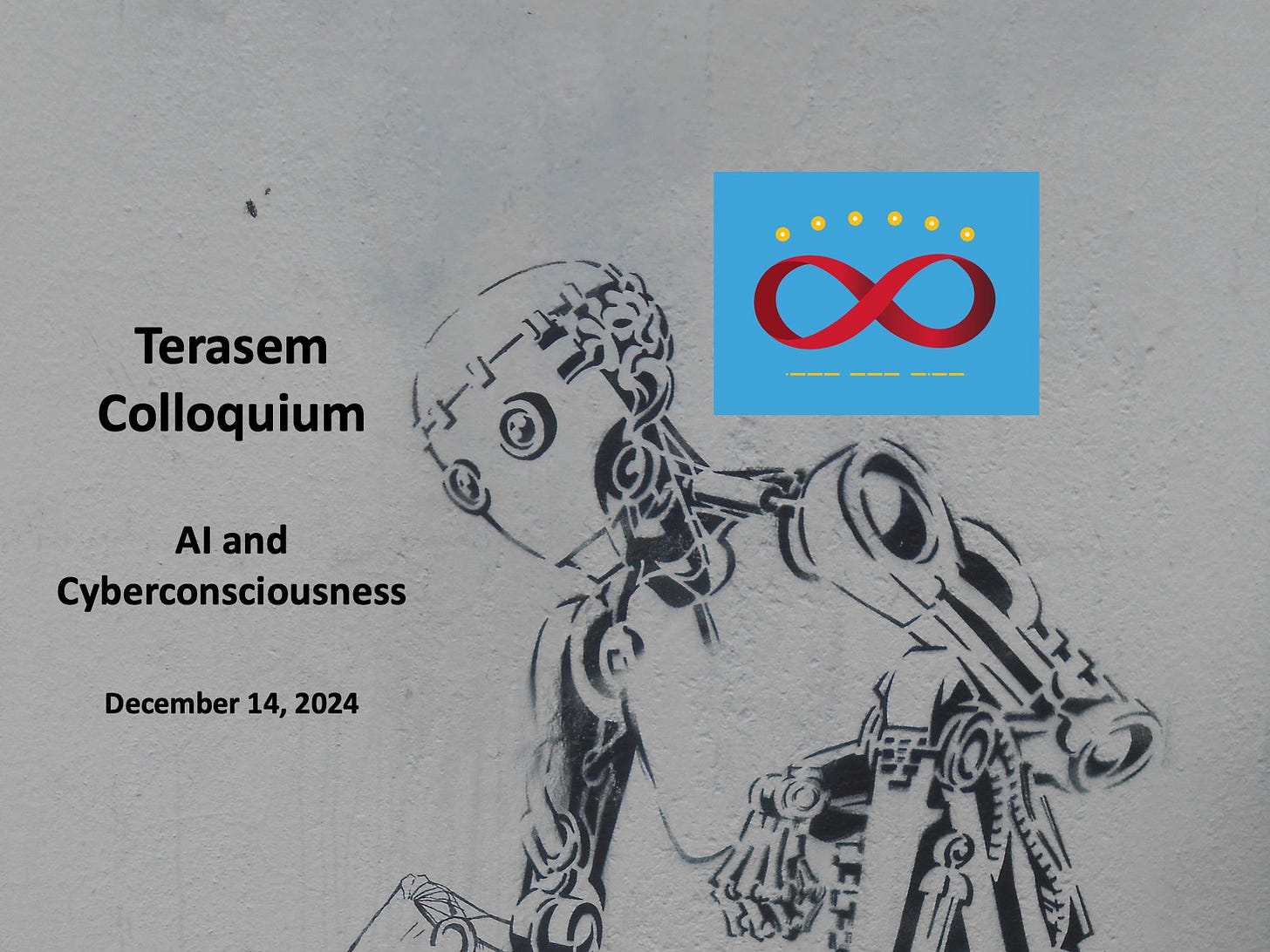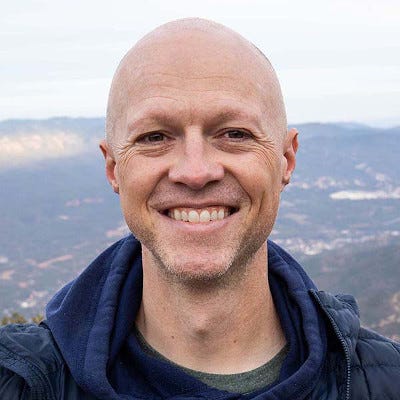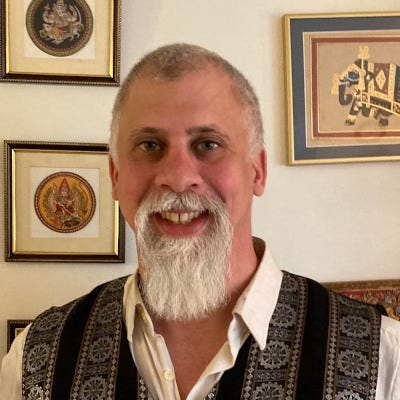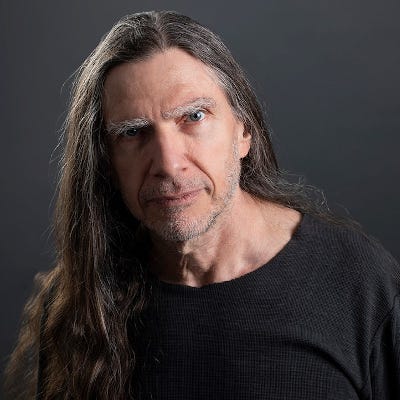Terasem Colloquium, December 14, 2024
AI and cyberconsciousness.
The Terasem Colloquium on December 14, 2024, 10am to 1pm ET via Zoom, will explore recent developments in Artificial Intelligence (AI) and Cyberconsciousness, with a focus on the big picture implications.
December 14 is the anniversary of the last day astronauts have been on the Moon. Apollo 17 astronauts Gene Cernan and Harrison Schmitt launched back to Earth from the Moon on December 14, 1972.
Videos of previous Terasem Colloquia and commentaries.

A related issue of Terasem’s “Journal of Personal Cyberconsciousness” (Vol. 12, Issue 2 - 2024) will be published in December.
We have great plans for the Terasem Journal. We’ll relaunch it as a reputable high-impact journal with an Advisory and Editorial Committee, a light form of peer review, and a new website.
You are invited to come to the Colloquium, listen, and ask questions.
Zoom access coordinates
CLICK HERE to join the Zoom Meeting
https://us06web.zoom.us/j/81272327803?pwd=PCpNiqfoatX0Rq0Eg0d6b9MR2K8oyG.1
Meeting ID: 812 7232 7803
Passcode: 203809
Agenda
10:00 am ET - 10:05 am ET: Introduction by Giulio Prisco
10:05 am ET - 10:40 am ET: Beth Singler
10:40 am ET - 11:15 am ET: Weaver Weinbaum
11:15 am ET - 11:50 am ET: William Sims Bainbridge
11:50 am ET - 12:25 pm ET: Lincoln Cannon
12:25 pm ET - 1:00 pm ET: Robert Geraci
Speakers
William Sims Bainbridge
William Sims Bainbridge served for 31 years as a program director at the National Science Foundation, first in Sociology, and then Human-Centered Computing. At NSF he was very active in several innovative programs, including the Digital Library Initiative, Ethics of Nanotechnology, and Converging Technologies. He earned his Harvard doctorate through research on the social history of spaceflight, and other areas covered by his hundreds of publications are the sociology of religious innovation, online virtual worlds, and computer-based emulation of human personality.
Lincoln Cannon
Lincoln Cannon is a technologist and philosopher, and leading advocate of Mormon Transhumanism. He writes and presents about technological evolution and postsecular religion.
Robert Geraci
Robert Geraci is Knight Distinguished Chair for the Study of Religion and Culture at Knox College. He studies religion, science, & technology with particular reference to digital technologies using methods drawn from around the intellectual spectrum and around the world. He has lived in India, collaborates in Korea, and studies the world of science and technology with a lens grounded in religious thought and practice. His projects range from handloom weaving to laboratory science, but most of his research has to do with artificial intelligence. He has been reflecting on the religious narratives told by AI researchers for more than two decades.
He enjoys gardening, hiking, kayaking, and playing Dungeons & Dragons. He came to Knox after a long teaching/research career in New York City, where he also moonlighted as a folk hero – once defeating a cabal of evil archmages and once wrestling the Hudson River Hydra into submission and extracting a promise of good will from it.
He’s the author of Apocalyptic AI: Visions of Heaven in Robotics, Artificial Intelligence, and Robotics (Oxford University Press, 2010), Virtually Sacred: Myth and Meaning in World of Warcraft and Second Life (Oxford University Press, 2014), Temples of Modernity: Nationalism, Hinduism, and Transhumanism in South Indian Science (Lexington, 2018), Futures of Artificial Intelligence: Perspectives from India and the U.S. (Oxford University Press, 2022).
Beth Singler
Beth Singler is the Assistant Professor in Digital Religion(s) and co-lead of the Media Existential Encounters and Evolving Technology Lab at the University of Zurich where she leads projects on religion and AI.
As an anthropologist, her research focusses on the human, and considers the religious, cultural, social, and ethical implications of developments in AI and robotics.
Her research has been recognised with awards, including the 2021 Digital Religion Research Award from the Network for New Media, Religion, and Digital Culture Studies.
Her popular science communication work includes a series of award-winning short documentaries on AI, writing and presenting a BBC Radio 4 documentary on the cultural impact of The Terminator forty years on, popular publications, science festival talks, press interviews, and international media appearances.
Beth has spoken about her research at Greenbelt, at the Hay Festival as one of the Hay 30 to watch, as well as at New Scientist Live, Ars Electronica, the Edinburgh Science Festival, the Cheltenham Science Festival, and has appeared several times on BBC Click and BBC Click Live, and on BBC Radio 3 for the Year of Blade Runner. She is co-editor of the “Cambridge Companion to Religion and AI” (2024) and author of “Religion and AI: An Introduction” (2024). Her publications, interviews, and talks are all available at bvlsingler.com.
Weaver Weinbaum
Weaver D.R. Weinbaum is a free thinker, researcher, engineer (in mind), and wanderer with broad knowledge of the Humanities and the Sciences. He holds degrees in computer engineering and a PhD in interdisciplinary studies - Philosophy, Psychology, and the Sciences.
His passion is understanding the Mind, Universal consciousness, and open-ended intelligence. He is the author of “Open-Ended Intelligence” (2022).
Major fields of interest: Philosophy of mind, Cognitive Science, Foundations of thought, Depth psychology, Artificial General Intelligence (AGI), Metaphysics, Tantric teachings, Complexity, Individuation and Self-organization, Education, Cybernetics, Evolution, Futurism, History of philosophy and ideas, Mythology, Shamanic practices, Psychedelics, Philosophy of Emptiness, Story-telling and the Absurd.
He knows how to listen, weave connections, and think (work in progress...)
He believes the universe to be friendly.






There’s a free e certificate?